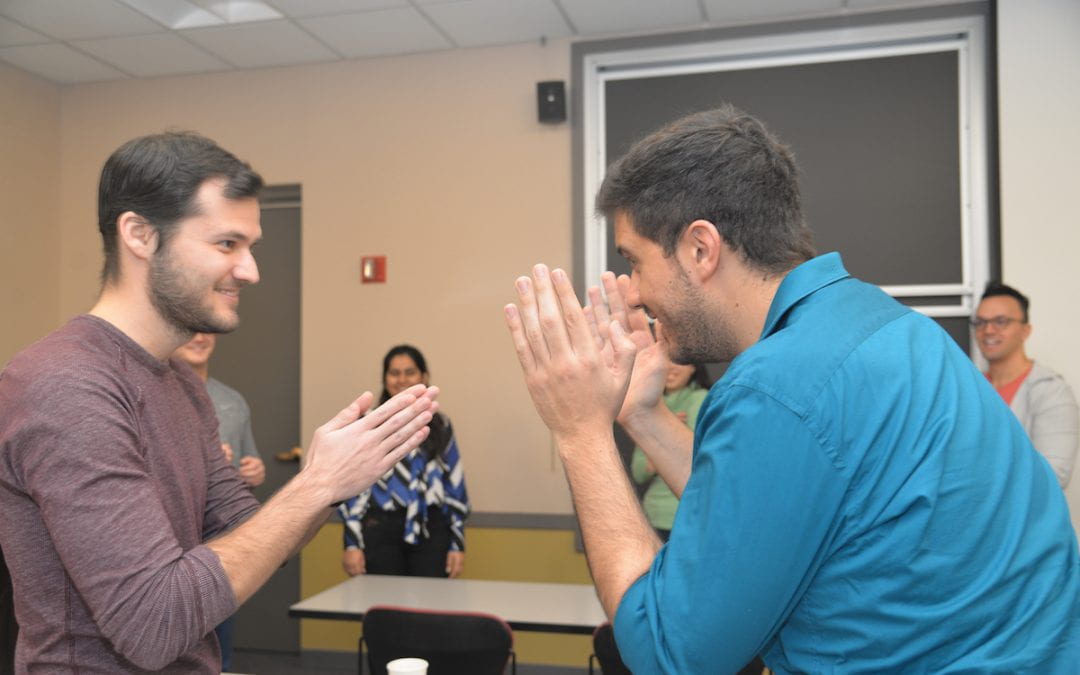
By Tom Bales
When I learned about the improv workshop being offered to full-time MBA students at the Kellstadt Graduate School of Business, I had no idea what to expect. I only knew that it was being led by Assistant Professor of Marketing Jim Mourey, so I knew we would all would be in for a treat. But what does comedy have to do with business? I was excited to find out.
“This is not a workshop where you will sit and listen to me lecture the whole time,” Professor Mourey said within the first five minutes of the workshop. And sure enough, we were on our feet in no time, playing games that literally emphasized thinking on your feet, the same way that improvisational performers do. We all formed a circle and the games began.
Jim pantomimed throwing a ball, exclaiming “red ball, Cynthia!” Cynthia managed to catch it without dropping it, an impressive feat. “Thank you, Jim!” Cynthia responded, signaling her acceptance of the ball. Locking eyes with the next player, Cynthia threw the illusory ball straight toward Carl. “Red ball, Carl!” The game continued on as players around the circle stood vigilant, waiting for their eyes to lock with the holder of the ball and hear their name as the ball barreled toward them. As the game progressed, other objects started to make appearances, further complicating the experience. Sounds silly, right? Well, there was a method to the madness.
Throughout the entire game, we had to remain prepared and adaptable. We were never sure when our name would be called or how to respond to the situation, and we had to go along with whatever our friends threw at us—whether it was the red ball, a sword or even the Harry Potter wand that came into the mix.
This exercise made me think about an interview scenario. In a job interview, how often are you uncertain with what the next question will be? In improv, an unexpected situation is valued because it signals a creative opportunity. Learning how to adapt to the unexpected is an invaluable skill to have in both comedy and business.
Professor Mourey emphasized that improv is all about trust. When actors are on stage together with no script, they have to be able to trust that when someone takes the show in a specific direction, the rest will follow and work together to build on the scene. Because of this, improv actors typically have excellent communication skills so they can let their scene partners know as soon as possible how they are going to direct the scene.
This same concept applies in business. The best work gets done when everyone on a team is working together, supporting one another and communicating effectively about the business plan and direction.
Another important rule of improv that Professor Mourey taught us is to always say “yes, and…” This means that we should agree to whatever improvisation is being thrown at us and build on it. In improv, this allows for the building of the scene and for the act to move forward.
Again this made me think of job interviews. Saying “yes” to an interview shows that we support the idea that we are a good candidate for the job. The “and” comes when we outline all the skills and experiences that make us a good fit. “Yes, and…” can also create a positive mindset about a question that is unexpected or unwanted. If you are inclined to say “yes,” and think on your feet—as improv requires—you’ll be more adept to add your “and” and give a good answer.
“Yes, and…” also made me think about being in a business meeting. During a brainstorming session, people generally start with what they believe are their best ideas. “Yes, and…” will support those ideas and keep the creativity flowing by encouraging more people to participate in the meeting. If you don’t create a “yes, and…” environment in a business meeting, people won’t be as confident to speak up, so they’ll stop adding to the conversation, which could lead to lost problem-solving ideas.
Professor Mourey’s improv workshop helped us develop unique ways of thinking, which I think could strengthen my skills in the business world. The event taught me to embrace the risk of the unknown, to treat my next job interview less like an interrogation and more like a conversation, and to show up to my career confidently, ready to both learn and contribute with a “yes, and…” mindset.
Tom Bales graduated from Northern Illinois University with a bachelor’s degree in political science. He is currently pursuing an MBA at the Kellstadt Graduate School of Business, specializing in accounting, and works in the Kellstadt Career Management Center as a graduate assistant.

Each summer, hundreds of Kellstadt students take on internships at companies around Chicago. It’s less a break from classes than it is a continuation of them; many classes at Kellstadt involve hands-on real-world components.
Below, three Kellstadt students reflect on their internship experiences — from work environments and passion projects to how Kellstadt helped them get there and where they’re going next.
The interns
David Burns, MBA ’24 (fall)
Continuous Improvement and Implementation program, NOW Foods
Mayuri Ghorpade, MS in Business Analytics ’25
Marketing Analyst, Mainstreet Investment Advisors
Hritik Gole, MS in Business Analytics ’24 (December)
Product Intern, Labcorp
On adapting to new environments …

Mayuri Ghorpade at her office for the summer.
MG: Coming from a hierarchical work environment in India, I was initially unsure of what to expect in an American workplace. However, I quickly found that everyone at Mainstreet Investment Advisors is incredibly friendly and always willing to offer help and guidance.
The workplace culture here values openness and freedom, breaking down traditional hierarchical barriers and fostering a collaborative environment. This was a refreshing change for me and has greatly enhanced my ability to contribute effectively to the team.
HG: The biggest adjustment has been transitioning from smaller startups to a Fortune 300 company like Labcorp. There’s so much to learn about navigating larger teams and processes, but I’m embracing the challenge with support from mentors and by learning as much as I can.
On the projects that inspire them …
HG: This summer, I’m diving into Labcorp’s Biopharma Digital Products Portfolio, where we develop software that helps labs streamline their operations. It’s been thrilling to see firsthand how our tech impacts healthcare behind the scenes.

David Burns in his office at Now Foods
DB: The main project I was hired to work on involves reducing changeover times. When a product is run, it’s done to fulfill a specific order, which can range from a few hundred to over a hundred thousand units. Between orders, we need to disassemble the production line, sanitize it, conduct quality tests, and prepare it for the next product.
To tackle this project, I drew inspiration from a scene in the movie “The Founder”, where the McDonald’s founders map out their processes on a tennis court, considering space, workers, and workflow. Similarly, I engaged with many of the machine operators to identify pain points in the process. I then used Excel to organize and analyze data from the past eight months to detect patterns and areas for improvement.
I’ve looked at every single step of the process. I might save 10 minutes here, or 20 minutes there. But because there are many steps, everything adds up.
On how Kellstadt helped them get there …
MG: Although I have previous work experience in India, adapting to a new country and its work culture was initially quite daunting. However, the comprehensive course curriculum at Kellstadt instilled immense confidence in me. The coursework emphasizes real-world applications of business analytics, which provided me with practical skills that I could directly apply during my internship.
DB: An innovation course I took at Kellstadt also played a crucial role in shaping my career vision. It taught me to think creatively and strategically about how I can bring innovation to companies professionally. This mindset has been instrumental in my approach to projects at NOW Foods.
On finding what fulfills them …
MG: The experience has shown me that I thrive in roles that combine creativity, strategic thinking, and analytical skills. I now envision myself pursuing a career that leverages both my technical skills and creative abilities. I am particularly drawn to positions that involve digital marketing, data analytics, and strategic planning, where I can contribute to innovative and impactful marketing campaigns.
DB: Before this internship, I never really knew what I wanted to do after graduation. My internship experience has given me a clearer vision of my career goals. I was given significant autonomy and minimal instruction, which allowed me to take initiative and explore various projects, including some that I conceived myself.
I’ve always been involved in music, and I believe much of my creativity stems from that background. The discipline and creativity required in music have translated well into my professional endeavors, allowing me to approach problems from unique angles.

Hritik Gole shows off his labcorp swag.
HG: Before joining Labcorp, I hadn’t thought much about working in healthcare. But now, seeing how my work can directly improve healthcare outcomes has been eye-opening. I’m now passionate about continuing to work in healthcare, focusing on making a positive difference in people’s lives. This internship has really guided me onto a path where I can use technology to benefit healthcare and society as a whole.
DB: Currently, I’m working on a proposal for a full-time role, as this program is new and offers the potential to create my own position. Although the internship has presented challenges, it has never felt like work. The dynamic environment and constant opportunities for improvement have been highly motivating and fulfilling.

By Krystin Simoy
As a recruiter in the tech industry, I connect with people in short amounts of time and analyze them based on their skills set on paper. I have to know people well within 30 minutes. Nothing more or less. Talent acquisition is a career I fell into after graduating from DePaul as an English major back in 2013. I gained insightful soft skills that I use today from my undergraduate experience, but I always knew that I wanted to earn a post-graduate degree. I just needed to find the perfect time.
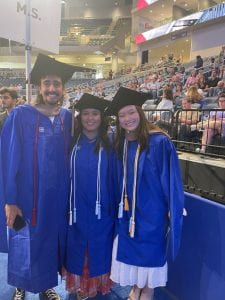
Krystin Simoy (center) with two of her MSHR cohort members at DePaul University’s June 2022 commencement ceremony.
Finally, in 2020, while working full-time as a recruiter, I decided to pursue my Master’s in Human Resources at Kellstadt. The irony is that the economy was in recession when I graduated the first time from DePaul in 2013. In 2022, when I graduated for the second time, we will likely enter another recession.
Navigating this job market has been challenging for everyone. Whether you are looking to transition to a new role or are new to the market, it is intimidating as companies are laying off a significant part of their employee population. Layoffs tend to be a cost-savings strategy to leverage the funds to get through a short amount of time. If companies are smaller, like start-ups, layoffs tend to be more permanent as the money was probably not allocated accordingly.
If I could give the 2013 version of me advice about job hunting, here is what I would tell myself. These tips helped me land my current role as I transitioned to another job while pursuing my MSHR degree at Kellstadt.
Be honest with yourself, really know your strengths and acknowledge your areas of improvement.
Employers these days are looking for people they can coach and mentor. Think of it this way, if you keep getting 100% in everything you do, are you actually learning anything? If you are starting in your career and do not have much experience, really think about what you know how to do. Create a list of soft and hard skills you possess. This will help you deliver a clear and concise message about your professional brand. Articulating your strengths and areas of improvement during a job interview shows maturity and accountability.
Know the industry landscape you are applying in and understand their hiring trends.
I know I will be in the technology industry for the foreseeable future. The reason being is because I know that it is stable. I know you are probably thinking, but Krystin, “LOOK HERE and HERE. How is there stability?!” For starters, FAANG-based companies (Meta aka Facebook, Apple, Amazon, Netflix and Google) are companies that have colossal employee populations. When I started my career, I knew I did not want to work for those companies because I wanted the impact of my hard work as an individual contributor to be visible sooner rather than later. I targeted companies with an employee population of 500-1000 and researched their CrunchBase.com profile. Sometimes at more prominent companies, you have to negotiate with yourself.
Typically what it comes down to is, “do I want to make a ton of money and work on the one thing I was hired to do?” or “am I comfortable to take x salary but know that my work can have an impact on the business?” I caution people, especially in this work climate, to think about where they will be in two years if they take the higher-paying job. I give a two-year timeline because if this recession is imminent, you have to prepare yourself accordingly. Will this compensation sustain you and your lifestyle before you look for another role? When you get a job offer, you also negotiate with yourself about your needs versus your wants. (If you are a current or incoming student at Kellstadt, I highly recommend taking the negotiations class.)
When applying for jobs, your best foot forward is actually a piece of paper.
Having a clean and tailored résumé is your first impression to any employer. Recruiters spend five seconds, if not less, looking at résumés to determine if they want to connect with the person on it. I recommend highlighting your internship, extracurricular and work experience if you are entry-level. If you have experience, I recommend adding quantitative values to your bullet points to showcase what you have done. Always start your bullet points with verbs or adverbs while using the STAR method (Situation, Task, Action and Results).
Example: Successfully hired 20 people within the first five months of starting across the human resource, finance, accounting and marketing departments; 20% of hires were passively sourced candidates from underrepresented groups to align with the company’s hiring goals.
Be selective with your job search.
I know you must cast a broad net to gain traction on your candidacy. However, I would highly recommend assessing what market you are applying to and why. Interviewing, at its core, is to determine if you have the foundational skillset to do the job. If you understand the industry well, it will be easier to articulate your experience from a soft skill perspective in an entry-level role. If you seek opportunities outside your current industry, leverage your foundational expertise to transition into another position. Recruiters are listening for the soft skills that will make you successful in the role and assessing your baseline knowledge about the opportunity.
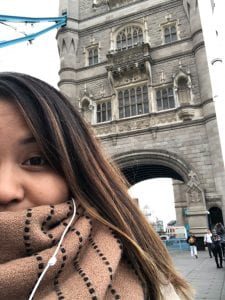 Krystin Simoy graduated in June 2022 from the Kellstadt Graduate School of Business with her MSHR degree. While attending school, she worked full-time as a talent acquisition partner within the technology industry. She was president of the Society for Human Resource Management at DePaul from fall 2021 to spring 2022. A Double Demon, she also holds a BA in English from DePaul. In her free time, Krystin provides career coaching guidance. She also likes to travel, as she grew up in Germany and is multilingual.
Krystin Simoy graduated in June 2022 from the Kellstadt Graduate School of Business with her MSHR degree. While attending school, she worked full-time as a talent acquisition partner within the technology industry. She was president of the Society for Human Resource Management at DePaul from fall 2021 to spring 2022. A Double Demon, she also holds a BA in English from DePaul. In her free time, Krystin provides career coaching guidance. She also likes to travel, as she grew up in Germany and is multilingual.
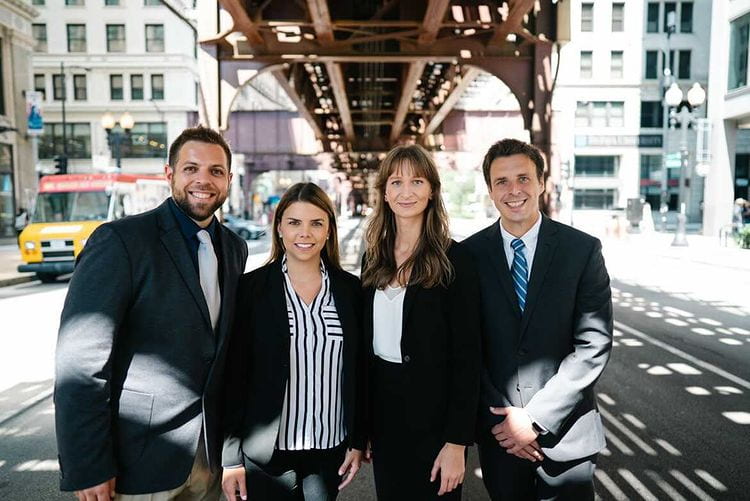
Board members of Kellstadt Partners pose on DePaul’s Loop Campus in downtown Chicago. (Photo by Ryan Silver)
By Nadia Alfadel Coloma
Student organizations at the Kellstadt Graduate School of Business are an integral part of what makes learning at Kellstadt engaging, rewarding and fun. They provide opportunities for expanding your network, diversifying experiences, exploring interests, building confidence and growing personally and professionally.
Whether you’re a full- or part-time student, you’ll find several opportunities to connect with Kellstadt student organizations throughout the year. Don’t know where to start? Take a look at these five organizations and what they have to offer:
 Kellstadt Partners
Kellstadt Partners
Kellstadt Partners (KP) promotes and develops lasting relationships within the Kellstadt community, while also providing the opportunity for students to explore new places in Chicago and expand their network “without the dreaded networking event.” They host monthly and sometimes biweekly social and career events that are promoted on the Kellstadt Partners Instagram account – @Kellstadt Partners – and the DePaul Kellstadt Networking and Job Forum on LinkedIn.
Why join?
- Getting involved with KP is easy because all Kellstadt students are already members
- Meet people and make friends
- Boost your mental health with fun social interactions
The best way to get in touch with KP is to contact them on Instagram.
 Kellstadt Women in Business
Kellstadt Women in Business
Kellstadt Women in Business (KWiB) is a professional development resource, with a focus on women empowerment, mentorship and network-building. The organization is planning a fall kickoff event in October, with details coming soon.
Why Join?
- Expand your network
- Learn from career panels
- Engage in roundtable discussions
Questions? Email kellstadtwib@gmail.com
Join the KWiB LinkedIn group
Follow KWiB on Instagram – @kellstadt_wib
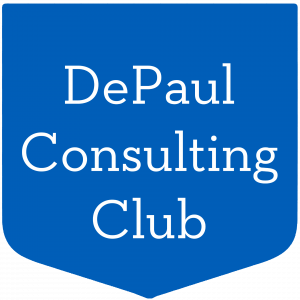 DePaul Consulting Club
DePaul Consulting Club
The DePaul Consulting Club (DCC) facilitates professional networking, skill development and career preparation for students interested in the field of consulting. Their key focus areas are:
- Networking – connecting students with alumni from various industries
- Experience – providing real-world experiences on pro-bono consulting projects with local nonprofit businesses
- Recruiting prep – offering workshops from the DePaul Career Center as well as experts from consulting firms
- Case competitions – engaging students in case competitions to enhance skills and improve career prospects for members
Why Join?
- Gain consulting experience through applied projects
- Network with your peers, alumni and professional consultants
- Learn from a host of professional development workshops
- Get help with case competition prep
Upcoming DCC event:
Tuesday, Sept. 28 fall kickoff from 5 to 6 p.m. with My Consulting Offer. Register here.
Questions? Email depauluconsultingclub@gmail.com
Join the DCC LinkedIn Group
Follow DCC on Instagram – @depaulconsultingclub
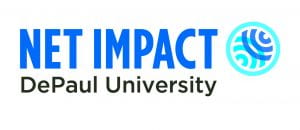 DePaul Net Impact
DePaul Net Impact
DePaul Net Impact is DePaul’s only professional sustainability networking group. They are a chapter of the international nonprofit organization Net Impact with 400-plus global chapters and more than 100,000 members, and were recently awarded the Net Impact Gold Status for 2021-2022. Their mission is to provide students a platform to engage with and become part of a network of leaders in social and environmental impact for sustainable development.
Why Join?
- Meet other students interested in bringing sustainability to their academic and professional careers
- Attend sustainability-focused events
- Connect with and learn from sustainability professionals, and maybe even find internship or professional opportunities with impact in mind
Watch this short video on how DePaul Net Impact can support your career journey as a student interested in sustainability.
Upcoming DePaul Net Impact events:
- Thursday, Sept. 30 Meet and Greet on the Lincoln Park Campus north quad from 4 to 6 p.m. (no registration required)
- Fall sustainability career fair (date TBD), being planned in conjunction with the Kellstadt Career Management Center and George Brigandi, director of the Master’s in Sustainable Management program
Questions? Email depaulnetimpact@gmail.com
Join the DePaul Net Impact LinkedIn Group
Follow DePaul Net Impact on Instagram – @depaulnetimpact
 Kellstadt Business Analytics Organization (KBAO)
Kellstadt Business Analytics Organization (KBAO)
The Kellstadt Business Analytics Organization is a community of mindful leaders who focus on intellectual and professional growth inside and outside of the classroom. Their goal is to help prepare students to be highly competitive data-driven business leaders by promoting knowledge and awareness of the latest data technologies, trends and concepts, as well as building a valuable networking community.
Why join?
- Get KBAO event information right when it becomes available through the members mailing list
- Gain exclusive opportunities to network with Kellstadt alumni who work in analytics and other analytics professionals
- Build your network and be a part of a strong community of fellow analytics enthusiasts
Upcoming KBAO events:
- Tuesday, Sept. 28 Virtual Happy Hour from 5:30 to 7 p.m. Register here
- Fall Alumni Connect and Industry Panel (virtual event focused on connecting students with analytics professionals from different industries) – being planned for later in the quarter
Questions? Email kellstadtbao@gmail.com
Follow KBAO on LinkedIn
Follow KBAO on Instagram – @kbaodepaul
Nadia Alfadel Coloma (MA ’11) is a communication analyst at the Driehaus College of Business and the editor of the Inside Kellstadt blog.

The first-generation MBA graduate shares insights from his career journey in business strategy and the importance of following your curiosity
In this series, Kellstadt alumni share how they got to where they are today in their careers. Our next feature is Mike Mercado, a senior manager of product strategy for Discover Bank, the deposits arm of Discover. Mercado completed the part-time MBA program with dual concentrations in entrepreneurship and business strategy & decision-making in 2016. Chicago-born and raised, he now lives just outside of the city in Park Ridge, Ill.

Mike Mercado/Amanda Nippoldt Photography
As a senior manager of product strategy…
I’m responsible for the strategy, financial performance and roadmap for Discover’s savings, Certificate of Deposit and retirement products. On any given day that could look like leading market research to better understand the needs of our customers, partnering with finance to understand how to meet these needs in a viable way or working with agile teams to build the features to meet those needs.
Biggest challenge of my job…
Balancing the needs of the customer and the business can be really challenging, particularly in large publicly traded companies. That is why it is so important to have a clear and properly socialized strategy in place. What is our vision? Who is our customer? How will we solve their most valuable problems in a sustainably differentiated way? If you know the answer to questions like these it becomes possible to make investments in long-term growth rather than chasing short-term returns.
What I like best about my job…
I love the variety of work you get to do when working in product. A lot of people say that working in product is like being a mini-CEO, which I think is true in terms of scope. If consumer preferences change or new FinTech challenges emerge, I’ve got to think about the strategic, financial and operational implications.
I also really enjoy the challenge of trying to figure out how to help people save more money. There is so much that goes into that decision at the individual level. I find it fascinating to unpack the psychology behind it, and motivating to feel like if I do my job well, I can help do some good.
How I got here…
Over the course of my career I’ve worked in technology, marketing and strategy, so transitioning to product has felt natural, but it was not an intentional outcome. I am a first-generation high school graduate without many relatives who have experience in corporate America. As a result, most of the jobs I’ve held I didn’t even know existed before I started my career. I wish I could say things have gone exactly as I’d planned, but really my career path has been more about chasing opportunities to solve interesting problems, all while working for someone I could learn from.

Mercado with his “strategic analysis for competing globally” capstone course team in fall 2016 on the Loop Campus.
Things I did to help me get here…
I think the two most important things I’ve consistently done to help me get to where I am today are following my curiosity and deliberately working to improve my communication. I’m a naturally curious person—I love learning how things work. This drives me to constantly ask various forms of “why,” which has been such a powerful tool because if you ask “why” over and over you’ll either run out of “whys” and arrive at first principles, or you’ll run out of answers and arrive at new opportunities. However, you need communication skills to articulate these first principles or new opportunities to others. While I was in Kellstadt, I remember trying out different communication styles while working on group projects to help me figure out what works best in different situations and with different types of people.
The Kellstadt faculty member who helped me the most in my career…
Professor Rafael Tenorio and Associate Professor Zafar Iqbal both made a big impact on my career. Early in my career while I was working in technical roles, I got a lot of feedback that I needed to be more “strategic,” but no one could ever tell me what that really meant. Rafael and Zafar’s courses really helped me understand strategy as a discipline, and their debate-driven lecture styles gave me an opportunity to sharpen my point of view with my classmates. I’ve held strategy roles almost exclusively since graduating from Kellstadt and I don’t think that would have been possible without their help.
Advice for Kellstadt students interested in my career…
There are a lot of different paths into product. If you’re interested but are having trouble breaking into the field then I think it helps to build a strength in one of the sub-domains, which in my opinion are technology, user experience design and strategy. I think it can be easier to find roles focused in one of these areas, which you can then parlay into a product role.
Read the other spotlights in this series:
Tommy Lubinski (BUS ’09, MST ’11, MBA ’15), product manager for adidas Basketball, talks about how he landed his dream job working in the sports apparel and footwear industry.
Angela Yang (MBA ’19), strategic analytics supervisor for FCB Chicago, describes how she transitioned from a career in advertising to healthcare strategy.








 Krystin Simoy graduated in June 2022 from the Kellstadt Graduate School of Business with her MSHR degree. While attending school, she worked full-time as a talent acquisition partner within the technology industry. She was president of the Society for Human Resource Management at DePaul from fall 2021 to spring 2022. A Double Demon, she also holds a BA in English from DePaul. In her free time, Krystin provides career coaching guidance. She also likes to travel, as she grew up in Germany and is multilingual.
Krystin Simoy graduated in June 2022 from the Kellstadt Graduate School of Business with her MSHR degree. While attending school, she worked full-time as a talent acquisition partner within the technology industry. She was president of the Society for Human Resource Management at DePaul from fall 2021 to spring 2022. A Double Demon, she also holds a BA in English from DePaul. In her free time, Krystin provides career coaching guidance. She also likes to travel, as she grew up in Germany and is multilingual.
 Kellstadt Partners
Kellstadt Partners Kellstadt Women in Business
Kellstadt Women in Business DePaul Consulting Club
DePaul Consulting Club DePaul Net Impact
DePaul Net Impact Kellstadt Business Analytics Organization (KBAO)
Kellstadt Business Analytics Organization (KBAO)



Recent Comments